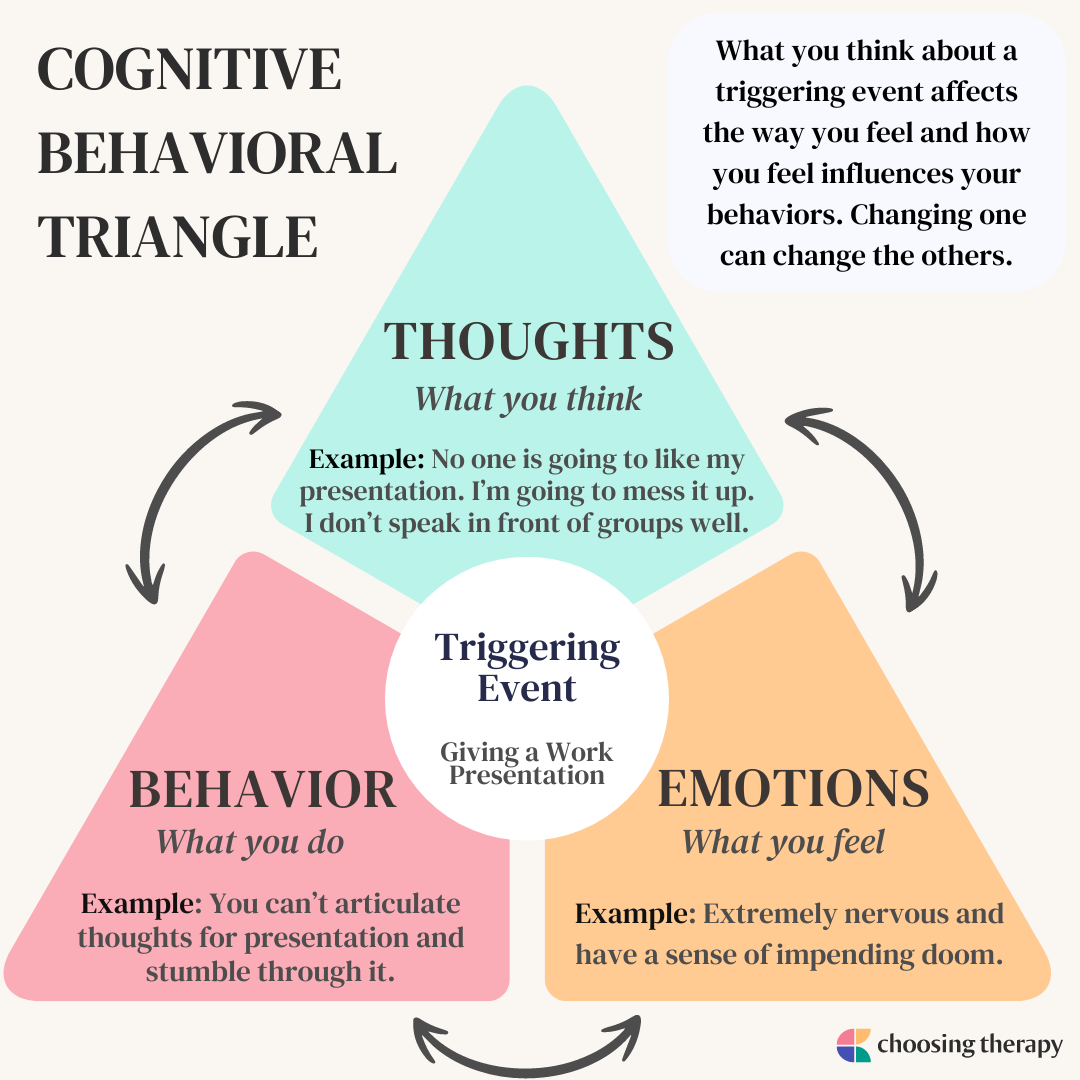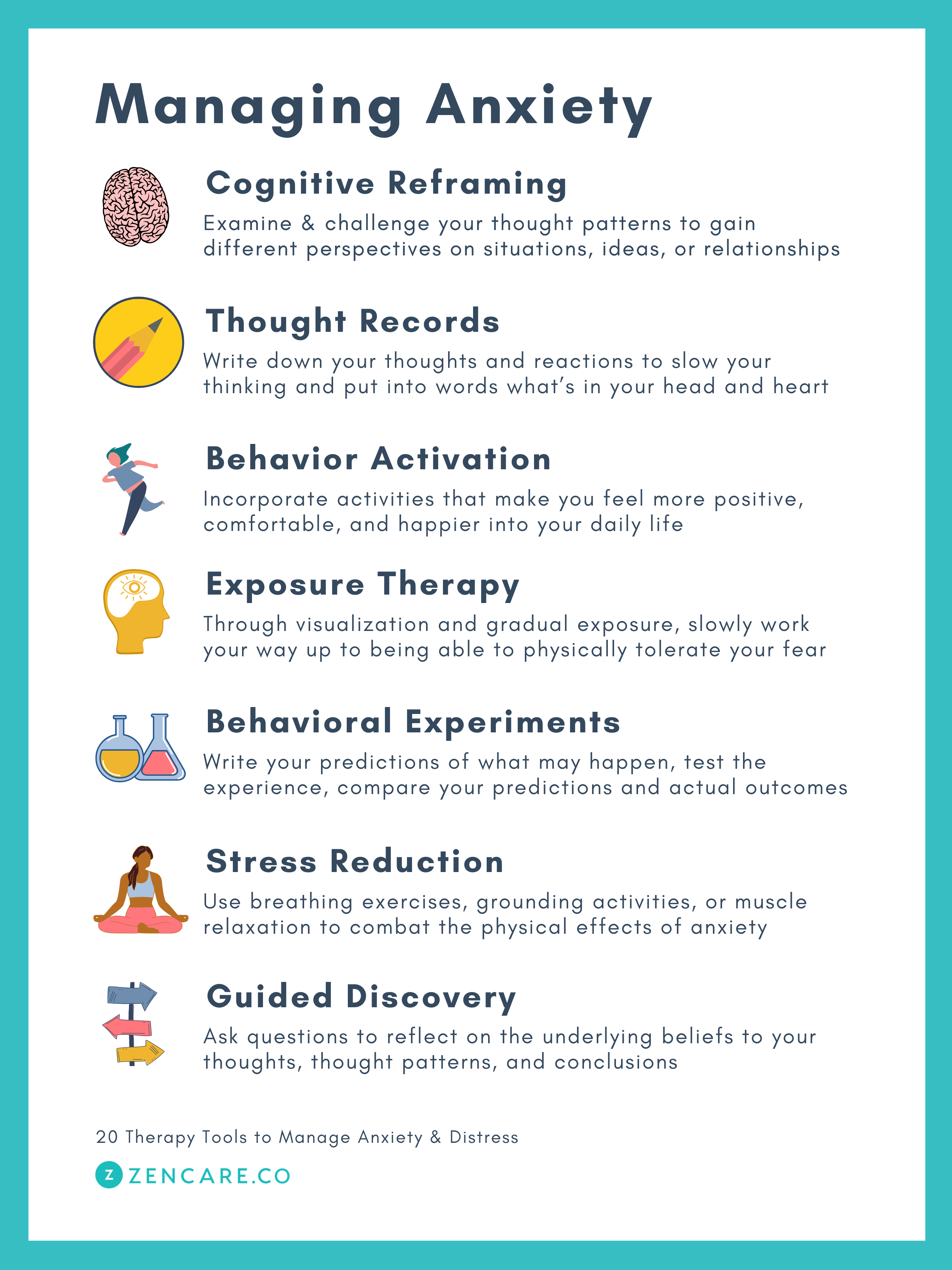Exploring Various Techniques in Coaching for Stress And Anxiety Disorder for Enduring Adjustment
When dealing with anxiety problems, it's vital to discover a selection of counseling techniques. Each approach offers special insights and tools to help you manage your signs and symptoms effectively. You may discover that incorporating methods can generate the very best results. Understanding the nuances of these approaches is crucial to fostering long lasting modification. Suppose the right mix could launch a brand-new level of psychological health for you?
Understanding Anxiety Problems: A Quick Review
Anxiety disorders, which influence millions of people worldwide, can significantly affect day-to-day life. You could experience frustrating sensations of anxiety or fret that seem uncontrollable. These sensations can result in physical symptoms like an auto racing heart, sweating, or even lightheadedness. Typical kinds of stress and anxiety disorders consist of generalized anxiousness disorder, panic attack, and social anxiousness problem. Each has one-of-a-kind signs, however they all share a propensity to interrupt your regular and relationships.Understanding the origin causes of your anxiety is vital. It may originate from genes, brain chemistry, or life experiences. Recognizing your triggers can assist you handle your actions much better. It's crucial to keep in mind that you're not alone in this battle. Lots of people face similar difficulties, and looking for help is a solid action toward sensation much better. By learning more about stress and anxiety problems, you're currently on the course to understanding and managing your condition better.
Cognitive-Behavioral Therapy: Challenging Negative Thought Patterns

Recognizing Negative Thought Triggers
When you experience moments of distress, recognizing the specific triggers behind your unfavorable thoughts can be necessary in taking care of anxiousness. Begin by taking note of circumstances that prompt feelings of worry or concern. Is it a crowded area, a future due date, or a conversation with specific individuals? Take down these instances in a journal. This will certainly help you recognize patterns in your thinking. Additionally, notice physical feelings that accompany your negative thoughts, like an auto racing heart or rigidity in your chest. By identifying these triggers, you obtain understanding into what's sustaining your anxiety. Understanding these links is the first step in testing those ideas and ultimately reclaiming control over your emotional responses.

Changing Thoughts With Positives
Testing negative idea patterns is a vital action in transforming your attitude and reducing anxiety. You might commonly locate yourself caught in cycles of insecurity or disastrous thinking. As opposed to letting these ideas determine your feelings, practice changing them with positive affirmations or practical options. For instance, when you think, "I can not handle this," change it to, "I can take care of obstacles one step each time (Counseling services for anxiety)." This simple adjustment can greatly influence your mood. On a regular basis determining and countering these adverse thoughts aids produce a healthier inner discussion. Keep in mind, it takes some time and effort, yet continually exercising this strategy can cause long-term adjustment, empowering you to encounter stress and anxiety with renewed self-confidence and durability
Structure Coping Techniques With Each Other
Changing unfavorable ideas is only the start of taking care of stress and anxiety effectively. To develop long-term change, you require to develop coping techniques that encourage you. Cognitive-Behavioral Therapy (CBT) aids you determine and test those unhelpful thought patterns. With each other, you and your therapist can discover how these thoughts impact your feelings and behaviors.Start by establishing practical techniques, like journaling or mindfulness exercises, that enable you to face anxiousness head-on. When you encounter your fears gradually, you'll learn to respond in a different way.

Mindfulness and Acceptance-Based Approaches: Growing Present-Moment Recognition
As you navigate the complexities of anxiousness, incorporating mindfulness and acceptance-based techniques can significantly enhance your capacity to cultivate present-moment understanding. By focusing on the present moment, you'll locate that you can observe your thoughts and feelings without judgment. This practice aids you recognize your anxiety without really feeling bewildered by it.Engaging in mindfulness workouts, such as deep breathing, body scans, or assisted meditations, allows you to ground yourself in your existing experience. Acceptance-based approaches urge you to accept your emotions instead of deal with versus them. They lose their power over you.Incorporating these techniques right into your everyday regimen can change exactly how you respond to anxiousness when you approve your sensations. You'll establish resilience and discover to browse demanding scenarios with greater simplicity. Inevitably, growing present-moment understanding lays the structure for enduring modification, encouraging you to lead a more meeting life.
Direct Exposure Therapy: Challenging Concerns Gradually
Direct exposure therapy assists you confront your fears in a progressive method, making it much less overwhelming. You'll find out strategies to encounter anxiety-provoking situations action by action, while likewise constructing coping methods to handle your reactions. This method encourages you to take control and decrease anxiousness gradually.
Progressive Direct Exposure Techniques
When encountering stress and anxiety, progressively facing your concerns can be a powerful method to regain control. This method, known as progressive exposure, involves slowly revealing yourself to the scenarios or things that trigger your stress and anxiety. Beginning with look at this now less daunting circumstances and slowly work your way up to more tough ones. As an example, if you're worried of public talking, you may start by talking before a mirror, after that progress to sharing thoughts with a friend, and eventually deal with a little team. Each step assists desensitize you to the fear, constructing your self-confidence in time. Remember, it's important to pace on your own and commemorate tiny success as you relocate with this procedure, enhancing your capacity to manage stress and anxiety efficiently.
Building Coping Methods
Building efficient coping techniques is necessary for handling stress and anxiety, especially as you confront your concerns progressively. One powerful method is direct exposure treatment, where you start by encountering your fears in a controlled manner. Start with much less intimidating circumstances and gradually work your means approximately more tough situations. This steady direct exposure aids desensitize you to stress and anxiety triggers, making them much less overwhelming.Incorporate relaxation methods, such as deep breathing or mindfulness, to relax your mind during direct exposure. Track your development, commemorating little triumphes in the process to boost your self-confidence. Keep in mind, it's okay to take your time; the objective isn't perfection yet constant renovation. By developing these methods, you'll empower yourself to browse stress and anxiety and embrace life a lot more totally.
Psychodynamic Therapy: Revealing Root Reasons of Anxiety
Psychodynamic therapy explores the unconscious mind, exposing the origin causes of your stress and anxiety - Counseling services for anxiety. By analyzing your ideas, sensations, and past experiences, this approach helps you discover underlying problems and unresolved problems that might add to your existing stress and anxiety. You'll collaborate with a specialist to check out youth experiences, relationships, and psychological patterns that form your actions today.As you get insight right into these much deeper layers of your psyche, you'll start to recognize how past events influence your present behavior. This understanding can result in catharsis, allowing you to process emotions you might have suppressed.Through the therapeutic relationship, you can also identify defense reaction that may have developed in time, providing a clearer path to alter. Eventually, psychodynamic therapy equips you with the tools to resolve your anxiety at its core, advertising long lasting transformation in your emotional health
Holistic and integrative Approaches: Integrating Techniques for Greater Efficacy
Incorporating different healing techniques can enhance your journey towards taking care of anxiety a lot more efficiently. By combining elements from cognitive-behavioral therapy, mindfulness practices, and holistic techniques, you can produce an individualized strategy that resolves your unique needs. For example, you might make use of cognitive-behavioral methods to test adverse thought patterns while integrating mindfulness exercises to ground yourself in the here and now moment.Additionally, exploring holistic methods such as yoga or meditation can promote leisure and minimize stress and anxiety signs. This mix enables you to establish greater self-awareness and resilience.Experimenting with these varied methods can aid you uncover what reverberates most with you. Keep in mind, it has to do with finding a synergy that functions, rather than sticking to a solitary method. This integrative method not just offers instant alleviation yet also promotes lasting skills for taking care of anxiety, equipping you to recover control over your life.
The Role of Support Solutions: Building Durability Via Connection
While it may appear that managing stress and anxiety is a solitary journey, having a strong support group can play a necessary function in your strength. Surrounding on your own with understanding good friends, family, or support groups produces a risk-free space where you can openly share your experiences and sensations. You remind on your own that you're not alone in this struggle.These partnerships offer encouragement and can supply practical coping techniques that have actually functioned for others when you link with others. It's additionally an opportunity to obtain point of view; close friends can aid you see situations in different ways, minimizing feelings of isolation.Moreover, psychological assistance fosters a sense of belonging, which can substantially alleviate anxiety signs and symptoms. By leaning on your support group, you can build resilience and take on challenges better. Bear in mind, connecting for aid signifies toughness, and it can make all the difference in your trip towards handling anxiety.
Regularly Asked Concerns
What Are the Typical Signs And Symptoms of Stress And Anxiety Problems?
You might experience uneasyness, check here fatigue, problem focusing, irritability, muscle mass stress, and sleep recommended you read disruptions. Physical signs and symptoms can include fast heart beat, sweating, and trembling. Acknowledging these indicators early can assist you look for proper assistance and therapy.

How Lengthy Does Treatment Normally Last for Anxiety Disorders?
Therapy for stress and anxiety conditions typically lasts anywhere from a few weeks to a number of months. It actually relies on your individual needs, progress, and the methods your therapist utilizes to assist you handle your stress and anxiety efficiently.
Can Medication Be Utilized Along With Treatment for Anxiousness?
Yes, drug can definitely be used alongside therapy for anxiety. Combining both approaches frequently enhances treatment effectiveness, helping you take care of signs and symptoms while exploring underlying concerns through counseling. Constantly consult your doctor for personalized guidance.
Are There Self-Help Methods for Taking Care Of Anxiety?
Yes, there are several self-help approaches for handling anxiousness. You can exercise mindfulness, involve in normal workout, preserve a balanced diet, establish a regular, and use deep breathing techniques to aid minimize stress and anxiety symptoms effectively.
Just how Do I Know if I Need Professional Aid for Stress And Anxiety?
You must think about looking for specialist help for anxiousness if it interferes with day-to-day live, creates considerable distress, or if self-help techniques aren't functioning. Trust your instincts; getting to out can result in far better coping skills and support. Usual types of stress and anxiety disorders consist of generalised stress and anxiety problem, panic condition, and social anxiousness disorder. When you run into moments of distress, recognizing the details triggers behind your unfavorable thoughts can be necessary in managing stress and anxiety. Replacing unfavorable ideas is only the start of taking care of stress and anxiety effectively. By analyzing your ideas, feelings, and past experiences, this method helps you discover underlying disputes and unsolved issues that might add to your present anxiousness. It's also a possibility to obtain perspective; friends can assist you see circumstances in different ways, reducing feelings of isolation (Counseling services for anxiety).Moreover, emotional support promotes a feeling of belonging, which can substantially alleviate anxiety signs